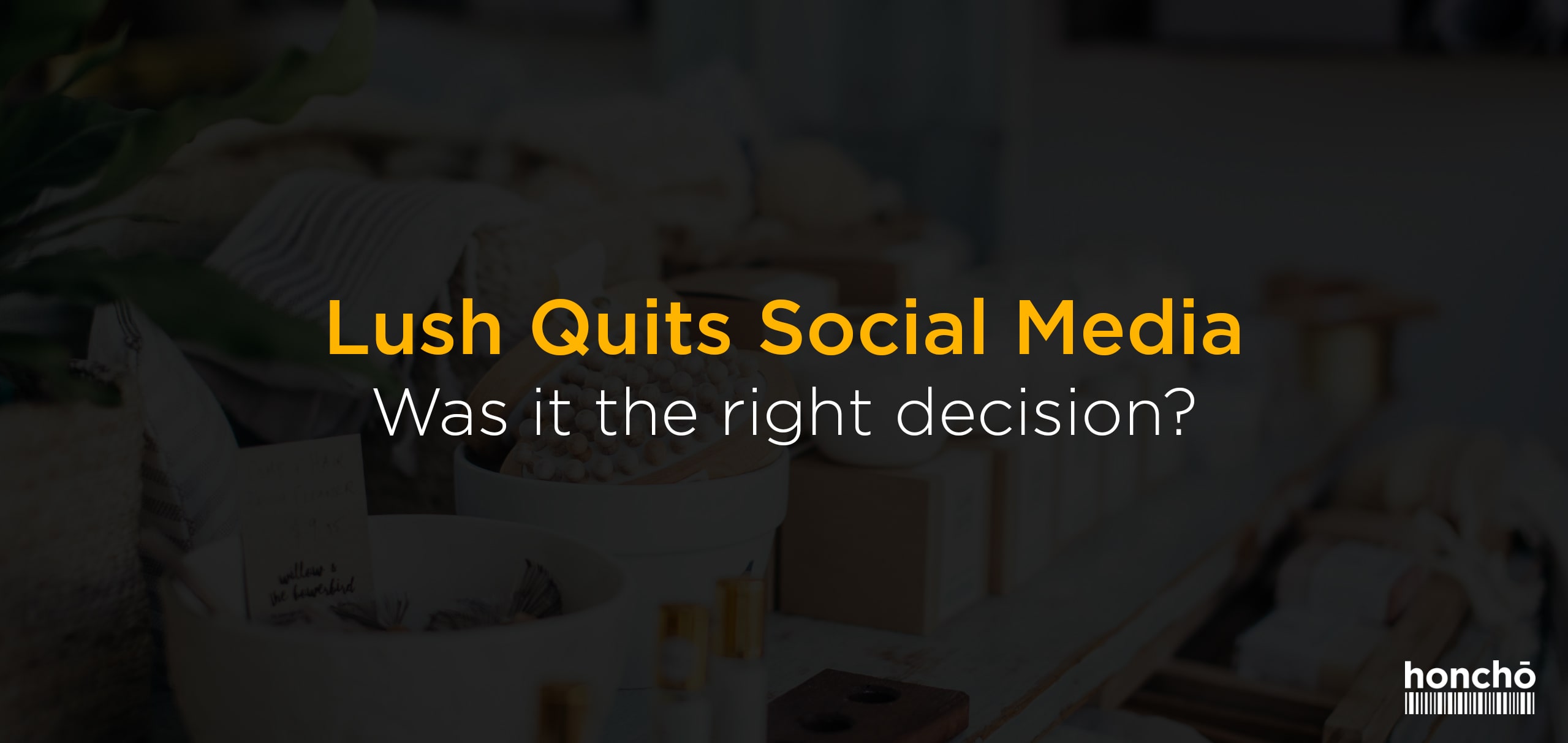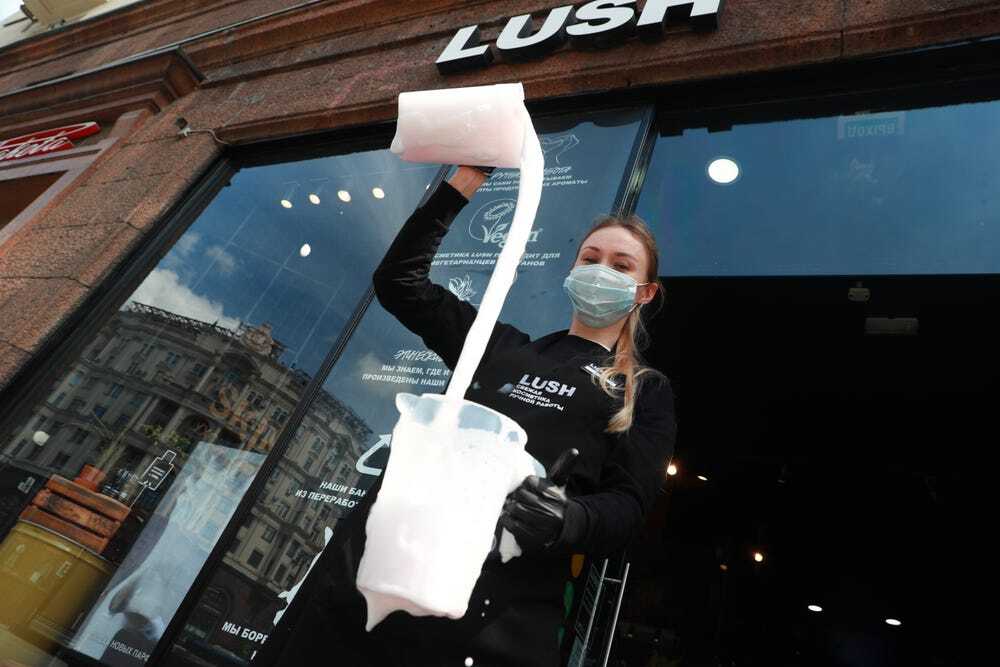3 min read
Honchō Scoops Up Two UK Search Awards!
It’s official, we've added not one, but two shiny trophies to our awards cabinet! We’re over the moon to share that we’ve triumphed at the UK Search...
4 min read
 Jade Halstead
:
Nov 30, 2021 11:55:34 AM
Jade Halstead
:
Nov 30, 2021 11:55:34 AM

FYI Lush… your customers don’t go onto Social Media to connect with you. They go on there to connect with the world, and you just happen to have an account that they followed.
Lush Retail Ltd, the British cosmetics retailer largely known for selling bath bombs and being the most overpowering smelling shop on any high street has announced that they are once again (yes, they jumped ship before in 2019 but came back on during the pandemic) boycotting a few social media platforms: Facebook, Instagram, Snapchat and TikTok.
Side note: All of their social media accounts are active however they will not be posted on and all are currently looking like this: (almost defeating the object of ‘boycotting’ the platforms.)

This is due to the mental health concerns of the platform users. Lush announced that until social media networks are safer for users, they will be suspending their social media accounts and finding other ways to connect with their customers.
Lush said, ‘In the same way that evidence against climate change was ignored and belittled for decades, concerns about the serious effects of social media are going largely ignored now’.
This second boycott hasn’t sprung from thin air though, it was the result of learning about some pretty serious allegations announced by Frances Haugen, a previous Meta employee.
Frances, before handing in her notice as product manager at Meta, collected some internal documents that held important data regarding mental health in teenagers.
The documents are the data and analysis of a two-year internal study carried out by Meta (Facebook at the time) into the effect of social media on teens’ mental health. One slide within the document stated, “We make body image issues worse for one in three teen girls”, which was seen by the Wall Street Journal.
Another presentation held by Meta said, “Thirty-two per cent of teen girls said that when they felt bad about their bodies, Instagram made them feel worse”.
With these documents, she has approached various media outlets across the globe, along with the British government to raise awareness of the harmful side effects of social media which Meta knows about, and isn’t addressing.

After living with her mother for 6 months, Haugen was inspired by her courage to speak up, saying “I lived with her for six months last year and I had such profound distress because I was seeing these things inside of Facebook and I was certain it was not going to be fixed inside of Facebook”.
“I did what I thought was necessary to save the lives of people, especially in the global south, who I think are being endangered by Facebook’s prioritisation of profits over people. If I hadn’t brought those documents forward that was never going to come to light.”
Back to Lush
Without going down too much of a rabbit hole into the Frances Haugen case, although it is extremely interesting and I highly recommend you follow it closely, let’s jump back to Lush.
The reasoning behind coming off social media has been made evident and with all best intentions being put on display. But is one company coming off social media enough to make a widespread difference? Or would staying on social media to support their customers through difficult times have been more appropriate?
The announcement on their social media said, ‘We hope that platforms will introduce strong best practice guidelines, and we hope that international regulation will be passed into law. But we can’t wait. We feel forced to take our own action to shield our customers from the harm and manipulation they may experience whilst trying to connect with us on social media’.
“Lush promises not to be completely anti-social. We will do all we can to find new ways to connect, to build better channels of communication elsewhere, as well as using the older tried and tested routes. For now, we can still be found on Twitter and YouTube”.
Mark Constantine, Lush’s co-founder and chief executive said: ” There is now overwhelming evidence we are being put at risk when using social media”, however, as mentioned in the opening to this blog, Lush’s customers don’t jump on social media to engage with them, it’s just a by-product.
Across Lush’s social media accounts, they had over 10 million followers, which is potentially 10 million lives they could’ve impacted if they had stuck around.
One of Lush’s stances in coming off the platforms is concerns that Meta is prioritising profits over people, with the never-ending algorithm designed to keep people engaged.
“We’re talking about suicide here, not spots or whether someone should dye their hair blonde… how could we possibly suggest we’re a caring business if we look at that and don’t care?”
From an outside perspective, if Meta wants to continue to grow into this all-consuming metaverse, they surely will not be able to put the people of their platforms first.
If Meta were to encourage users to step away from their platforms, they are essentially asking to lose money, which is why I highly doubt they’ll ever do it. However, I do hope they prove me wrong.

So, what keeps us on these social media platforms? Dopamine.
Dopamine! This chemical is stimulated every time we post, after every like and it loves every comment saying we look great. The dopamine keeps us scrolling… Our brains are constantly looking for that next spike.
Have you ever been bored and picked up your phone? That’ll be your brain looking for dopamine.
If you haven’t already watched The Social Dilemma on Netflix, check it out, it digs deep into the algorithm and this all-enticing hormone.
What is really going to make a difference to social media?
We don’t really know. While more and more people are downloading social media apps and being sucked into the dopamine addiction spiral, all I can guess is Lush stepping off of social media isn’t the answer. But I do hope it encourages Meta to re-evaluate their strategy.
What do I think?
As someone who has used social media for over a decade, and even longer if Club Penguin counts, I can completely empathise with everyone who struggles with mental health due to the influences we see on social media.
It is rumoured that Lush could lose £10 million by coming off of social media. If I had the power at Lush to make some improvements with that money, here are the initiatives I would put forward;
So, I’ll leave you with this question to think about, rather than boycotting social media, what can your accounts be doing to improve the lives and mental health of your customers?

3 min read
It’s official, we've added not one, but two shiny trophies to our awards cabinet! We’re over the moon to share that we’ve triumphed at the UK Search...

5 min read
Understand ecommerce attribution models which attribution models can maximise your marketing efforts and ROI.

3 min read
Explore how social commerce is changing the way we shop online, blending social interactions with digital commerce for a seamless buying experience.